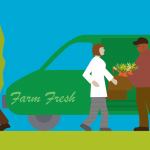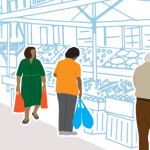Farm to Corrections
Integrating California-grown produce into the state corrections system
California, an abundant agricultural state, is charged with feeding and maintaining the well-being of the United States’ second-largest state prison population every day. Despite an abundant supply of fresh produce and the potential for steady demand from California’s prisons, many opportunities to increase the amount of California-grown specialty crops available to prison residents remain untapped. Improving farm-to-corrections food systems could increase the health and well-being of people who are incarcerated and expand economic prospects for local agricultural communities.
The University of California Nutrition Policy Institute, Impact Justice, and ChangeLab Solutions are collaborating to increase the amount of California-grown produce used by California’s corrections system. Our suite of resources presents findings from interviews, policy analyses, and procurement scans to describe the current context for procurement of specialty crops in California state prisons and also discusses avenues and barriers for growers, policymakers, corrections staff, and others who wish to facilitate procurement of local produce.
California produces more fruits and vegetables than any other state, yet too little of this produce makes its way to the plates of people who are incarcerated in California. In this report, we identify considerations involved in efforts to improve the health of people who are incarcerated (as well as the greater California community) by increasing purchases of California-grown specialty crops by the California Department of Corrections and Rehabilitation.
Case Studies: Promising Practices from Across the United States
This brief presents case studies that highlight correctional facilities’ varied approaches to increasing residents’ access to fresh local produce. Findings are presented in three sections: contracting and procurement; sourcing and relationships; and supplemental food. Through this resource, we seek to lift up promising practices and demonstrate that prisons can successfully source local food, as other large institutions, such as school districts and hospitals, have been doing for many years.
Fact Sheet: California’s Preference Policy for Agricultural Products Grown Within the State
California’s Assembly Bill 822 (AB 822), passed in 2017, is a preference policy that requires state agencies to buy California-grown agricultural products if their price is not greater than 5% more than an out-of-state supplier’s price. This fact sheet can be used as a quick reference to help state agencies, policymakers, and policy advocates explain how AB 822 works and how it benefits California; summarize the status of AB 822’s implementation; or provide ideas on how implementation can be better supported.

